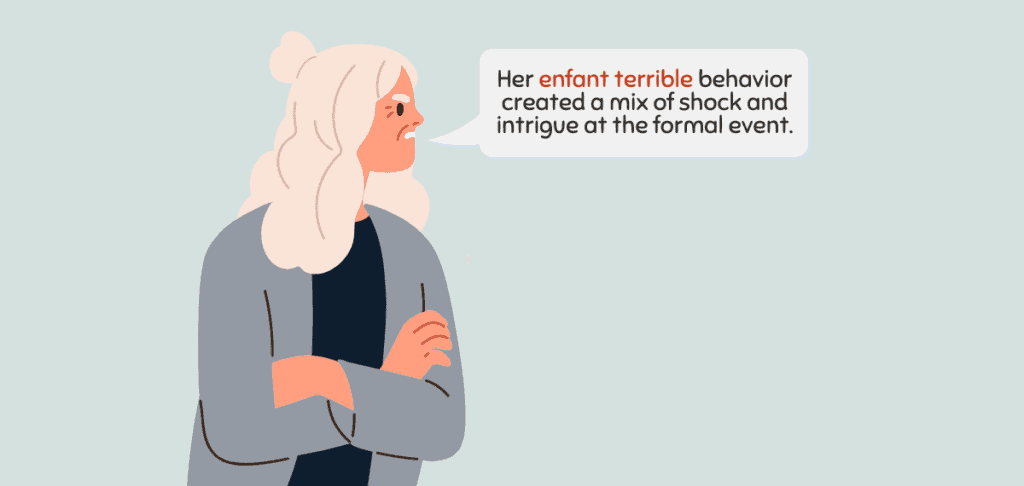If you’ve come across the term enfant terrible and are scratching your head over its meaning, you’re not alone! This strange expression is definitely puzzling if you don’t know its meaning. So, I’ll uncover the true essence of this tumultuous term, and you’ll be using it like a native French speaker in no time!
Meaning of Enfant Terrible

While directly translated, enfant terrible means terrible child. In its actual usage, it has a bit more nuance. The term is used to describe someone who behaves unconventionally or rebelliously, particularly within a polite society or a conventional organization.
Typically, an enfant terrible is brilliant and creative but also disruptive and unpredictable, causing shock or embarrassment. They’re the wildcards, the rabble-rousers, the ones who stir up a bit of chaos wherever they go. If this sounds like your favorite rock star or that avant-garde artist whose paintings you can’t quite comprehend, you’ve got the right idea!
Origin and Etymology of Enfant Terrible

The term enfant terrible originated in French as l’enfant terrible. And it’s one of the many phrases in English cheerfully borrowed from the language of love (and great cheese!), French. It started appearing in English literature in the mid-19th century to describe a child who embarrassingly speaks the truth where politeness would dictate discretion.
Jean Cocteau wrote a novel entitled “Les Enfants Terribles” in 1929 about two doomed siblings. The novel was made into a film directed by Jean-Pierre Melville in 1950 and an opera composed by Philip Glass.
Enfant Terrible Synonyms
Here are just a few other ways to say enfant terrible without making fun of a baby.
- Maverick
- Nonconformist
- Revolutionary
- Rebel
- Radical
Enfant Terrible Examples in a Sentence

It’s probably best to see this weird phrase in a full sentence to really grasp its proper use. Here are a few to check out.
- The company’s new CEO is an enfant terrible, implementing outlandish strategies that surprisingly boost profits.
- Banksy, with his off-kilter art techniques, is seen as an enfant terrible in the art world.
- The enfant terrible of the fashion industry surprised everyone by pairing sneakers with ball gowns at his runway show.
- Her enfant terrible behavior created a mix of shock and intrigue at the formal event.
- Oscar Wilde, with his acerbic wit and disregard for societal norms, was considered an enfant terrible of his time.
- As the enfant terrible of the film industry, he was known for his unconventional and controversial filmmaking style.
- His reputation as an enfant terrible made him popular among younger voters.
- Critics called him an enfant terrible for his radical ideas and blatant disregard for tradition.
- As an enfant terrible of the culinary world, she’s known for her unconventional dishes and presentation.
- Despite being an enfant terrible in the fashion world, his designs were always highly sought after.
A Terrible Conclusion
The term enfant terrible brings an interesting French flavor to the English language. It’s an expression of rebellion, creativity and disruption that adds depth to our descriptions. If you’ve got that slightly rowdy, mischievous, unorthodox spirit in you or know someone who does, you’ve got the perfect phrase to use. Check out our other idioms on borrowed words and phrases!
Check out some others we covered:
